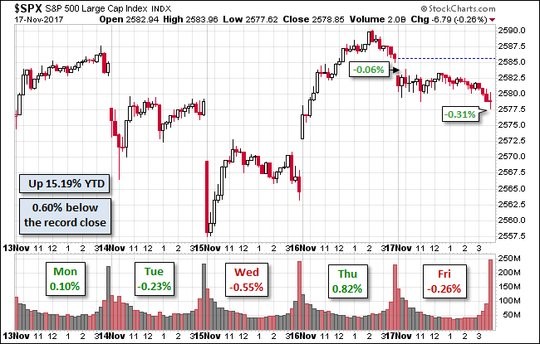This is the beginning of the end of the year for markets, writes Bob Savage, CEO of Track Research over the weekend.
U.S. markets are thin with the Thanksgiving holiday and Black Friday leading into month-end and the flip to December with all its pressure to end the year well – including the GOP push to pass tax reform, raise the debt ceiling, and further deregulate the economy.
And the FOMC is likely hikes rates, the rest of the world’s central bankers are on hold with the greater uncertainties of 2018 looming in the backdrop with geopolitics, as NAFTA and Brexit crack hit global trade, as OPEC considers how to sustain oil prices at $60 while Saudi and Iran heat up their cold war, while North Korea continues to nag the U.S. and China and while Russia continues to cast a longer shadow over Europe from Turkey to the Ukraine.
The U.S. dollar (USD/EUR) holds but hasn’t prospered while the Chinese yuan (CNY/USD) has beat expectations as China races for stability and a larger share of global power.

The focus of the markets in the past week was on the power of bubbles not yet popping, with a da Vinci painting selling for $450mn, on gold hitting one month highs, on bitcoin nearing $8000 with fear-of-missing-out (FOMO) buyers, but with oil suffering its first loss in 6-weeks, the USD down for the second week despite steady rates, more FOMC rate hikes priced, with bond curves flattening to decade lows, and with equities lower across major economies, suffering as emerging markets bounced.
High-yield bonds also suffered from the third largest outflow on record but overall, despite a majority of analysts calling for a larger correction, we saw more buying-the-dip and more complacency about how to invest over the next few weeks.
What seems clear is that many markets may be overvalued but not yet into a euphoric bubble phase or bubble pop drop. The lack of larger moves across many markets frustrates those looking for a turn in trend or those that have bought up protection for the worst-case scenario. 2017 has surprised us all for being the best-case with the least trouble to bad news events and geopolitical risks.
What happened over the weekend? Mugabe is ousted from his ruling party (ZANU-PF) in Zimbabwe, but he remains president – not yet ending 37-years of his rule after the military takeover last week. Emmerson Mnagagwa – the dismissed VP from last month – now is the new party leader and nominee of ZANU for the Presidential election next year.
Predictions for 2018 are coming fast and furious – with GS listing its top-ten trades last week and outlook – and the Geological Society of America suggesting there will be more intense earthquakes in 2018 - "The correlation between the Earth’s rotation and earthquake activity is strong and suggests there is going to be an increase in numbers of intense earthquakes next year," said Roger Bilham at the University of Colorado.
The UK FinMin Hammond is under pressure on his budget next week – promises to speed up home building, even as the “Brexit bill” proposal ahead of the EU Dec 14-15 meetings is likely to increase from the E20bn proposed by PM May last month.

China October house prices rose 0.3% m/m, 5.4% y/y after 0.2% m/m, 6.3% y/y. Tier-1 city prices fell 0.1% m/m after -0.2% m/m, while prices in tier-3 rose 0.3% m/m after 0.2% m/m.
The majority of the 70 cities surveyed by the NBS still reported a monthly price increase for new homes. Fifty reported higher prices in October from 44 in September, while 25 saw prices drop compared to 38 in September.
On a year-on-year basis, new home prices rose in 60 cities, down from 67 in September, helped by a favorable base effect, while they fell in 51 of 70, up from 49 in September. Of the cities showing y/y price growth decelerations, three were in Tier-1 cities, 22 were in Tier-2 and 26 were in Tier-3 cities.
Market Recap: The week began with China IP/retail sales missing, followed with General Electric (GE) cutting its dividend, then shifted to doubts about energy sustaining with Venezuela limited default aided by Russia, Zimbabwe capturing headlines with Mugabe under house arrest by the military and Saudi offering a purge deal to princes (70% of their wealth for freedom).
The low Wednesday tracked oil while the rebound Thursday followed dip buying and the GOP tax reform passing the House.
Markets were mostly sideways Friday with many cutting back positions early into Thanksgiving.
The week’s economic data were generally favorable. U.S. retail sales increased 0.2% in October, and housing starts and permits posted unexpected gains, rising 13.7% and 5.9%, respectively. The October producer price index rose 0.4% in October, more than anticipated.
The consumer price index rose only 0.1% for October, but the core rate (excluding food and energy prices) rose 0.2%, a bit more than expected.
Other key focus points: NAFTA starting its fifth round of talks in Mexico City, Brexit vote in the UK Parliament leaving UK May wobbly still, Draghi speech on Friday sounding dovish but not enough to reverse the EUR.
The ECB panel discussion with Yellen, Carney and Kuroda defended forward guidance as a key tool but didn’t matter much to bonds or stocks. Mueller investigations into Trump campaign mixing with further political pressures in Senate over tax reform added a level of uncertainty to US assets but didn’t really move markets either.
Focus on the talking-heads in the financial was on the risk of a larger equity correction even as the week proved to be much less volatile or scary.
View TrackResearch.com, the global marketplace for stock, commodity and macro ideas here











